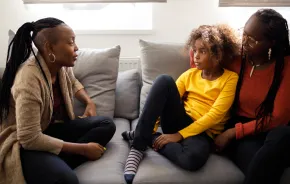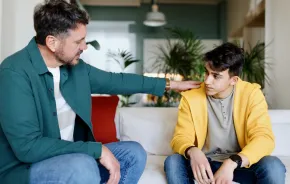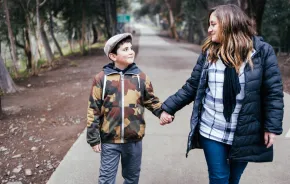Each day, the headlines grow more frightening. Child missing. Child abducted. Child molested.
It's enough to make you want to lock your child in her room with a TV
and a Barbie Doll Dream Castle and call yourself a responsible parent.
A parent can't be too careful. But sometimes, when parents issue dire
warnings and endless safety rules, it can -- to a child -- feel like a
suffocating dose of overprotection.
Often, overly concerned, worried parents transfer their fears to their
children, says Dr. James McKeever, a clinical assistant professor at
Children's Hospital and Regional Medical Center in Seattle. "Some
children will get anxious if their parents get anxious -- and they'll
learn to view the world as a dangerous place," he says. "This can
affect the child's ability to learn to cope."
Still, danger exists, and it's up to parents to find constructive ways
to protect their kids. How do they do it -- without overdoing it?
They can modify safety directives to fit the child's age, McKeever
says, noting that "different kids need different approaches." With
younger kids, the rules can be straightforward. "You can say, 'you have
to wear a helmet because your head can get injured,'" he adds. "You
don't need to be detailed."
Reinforce those rules by role-playing, says Stacy Holland of the
Redmond Police Department. "Present kids with different scenarios. Act
out the parts. And do it often."
Parents can engage in longer discussions with their teenagers, McKeever
notes. "The parent can express concern for the teen's safety and
explain what he or she believes as a parent."
With kids of all ages, talk about safety and don't dwell on danger,
suggests Joan Duffell, director of community education for the
Committee for Children. Telling your child, "there are so many ways to
keep yourself safe," can cover a wide range of topics; everything from
chasing after a ball to sexual abuse.
"A parent can say, 'When you get lost in a store, there are safety
rules. There are also safety rules about people, such as: Nobody has
the right to touch the private parts of your body unless it's to keep
you clean or healthy.'"
Check city police departments for safety programs. The Redmond Police
Department, for example, offers a child safety course for ages 7-13
several times a year.
The real dangers
A parent's view of the scary things lurking out there is often skewed,
Duffell says. "We teach our kids to be wary of strangers -- yet kids
are at far greater risk for harm from someone they know. Stranger
danger is the tiniest fraction."
Sexual offenders are frequently successful because they're confident
the child won't report the abuse, she says. "Parents must emphasize the
importance of telling. They should say, 'You can always tell me. I will
keep you safe."'
The Internet poses another threat. Youngsters often use chat rooms and
blogs as bullying tactics, Duffell says. "Kids are hurting their peers
and they don't necessarily even know what they are doing."
The Internet is also a popular forum for sexual predators. In the old
days, "stranger" referred to the eccentric guy down the street and not
some 42-year-old impostor infiltrating a chat room.
"These people can come in as if they are a 12-year-old girl," Duffell
notes. "They know how to sound like a kid."
Parents can protect their children by making sure the home computer is
used in a public place, by tracking their kids' Internet use, and by
investing in the latest monitoring technology.
Linda Morgan writes frequently on education issues for ParentMap.
Seattle Police Department safety tips
-
Kids should know their home address, telephone number including area
code, parents' first and last names, and how to call 9-1-1. - Kids should check the identity of the person at the door WITHOUT opening it.
- Learn the full names of your kids' friends, their parents' names, addresses and phone numbers.
- When your child is at a friend's home, know who else is present.
- Know your child's routes to and from school, play and errands. Insist they stick to the same route.
- Kids should be taught never to go anywhere with anyone without parental permission.
-
Kids should never play in isolated areas of parks or playgrounds, and
should avoid public restrooms, building sites and dark streets. - Teach them to run away from someone who is bothering them while yelling to attract as much attention as is possible.
-
Teach kids not to approach cars that stop to ask for help. If the car
follows them or the driver gets out, they should run away and yell. -
Some bad guys play tricks on kids. Tricks include bribes (money, toys,
games), lies (your mom told me to pick you up at school), requests for
help (my puppy ran away) or threats.









